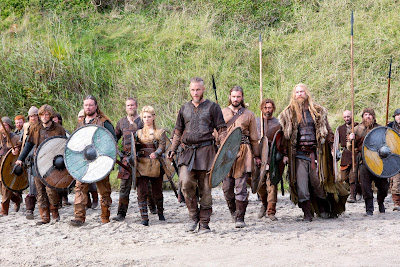 |
| I'm pretty much the best general I know . . . |
Napoleon once gave some simple
statistics* on tactics and order of troops:
Two Mamelukes can defeat three Frenchmen
100 Mamelukes are a match for 100 Frenchmen
300 Mamelukes would be overcome by 300 Frenchmen
1500 Mamelukes would be easily defeated by 1000
Frenchmen
What old Bonaparte is talking about is a
matter of individual skill versus group training. “Mamelukes” or Mumluks, were a warrior caste
in Medieval Egypt and great individual fighters. But their tactics were out of date when
Napoleon invaded Egypt and Syria. While
it’s great that Farmy McFarmerson, the Chosen One of the prophecy now has a
master swordsman, Colonel Cutter Slash Stabberhack to train him, this doesn’t
mean that A) a few weeks of work will turn him into a consummate expert or,
even if it does that B) he is now able to overcome a group of trained and
experienced soldiers.
 |
| Kirk kirk, kirk kirk-kirk! |
But
he’s the Chosen One!
Alright, great. No problem.
I’m totally cool with that provided that you cover some basics. Anyone with even rudimentary knowledge of
modern armies knows that an unshaven recruit will take months to get through training
before he/she can competently take to the battlefield. The U.S. Army requires 10 weeks of basic
training and, depending on the discipline, 6 weeks up to a full year of
advanced individual training. Keep in
mind that the age of gunpowder rapidly decreased
the amount of training required to create competent troops. Some of the best, most devastating troops of
the Middle Ages, like English longbowmen, started training to pull their bows
when they were old enough to hold one simply so they’d be strong enough to pull
a full draw when it came time to loose at the enemy. But archers alone, even the best of the best,
couldn’t defeat the enemy alone.
The best armies of the ancient times
(Romans, Assyrians, Chinese, etc.) knew this as well.
They dedicated months to training, training
and yes, more training. Consider, for a
moment, the amount of effort it takes to train a “simple” troop of spear. The spear is the most basic and longest-lived
weapon on the battlefield, and also one of the most formidable. It made up the backbone of almost any decent
fighting force (later modified into a mix of longer polearms like pike, glaive,
halberd, etc.). But the requirements to
simply form a shieldwall and advance in a fighting line weren’t as simple as
drawing in the dirt around a campfire. A
shield formation requires the frontline to link up, either with large shields
hard to penetrate or, as the TV show Vikings
likes to illustrate, a locked-system of overlapping shields. The second line (yes, there would be a second
line) would, when they actually met another shieldwall, push against the back
of the first, possibly overlap their shields over the heads of the first line
to ward off any missile attacks and at the same time thrust with their spears
and swords AND not getting stabbed by the other team.
 |
| Quick everyone, DIAMOND FORMATION! |
A very important lesson!
There’s a lot of things wrong with the Dwayne
Johnson movie Hercules, but there is
one definite thing right—training. Early
in the movie (small spoiler) Hercules is ordered by King Cotys to lead
untrained men into battle. Surprise, surprise,
they lose against the experienced evenmy.
Even Hercules, with his singularly spectacular team of individually
capable mercenaries is unable to put the smack down when Rhesus starts cooking.
They can’t. A few well trained men and women can’t
compete on an open battlefield with a troop of trained soldiers. On the other hand, you can witness at the
beginning of Gladiator and the TV
series Rome just what Roman armies
could really do against a determined force lacking in the same degree of
training and experience and tactics:
But individually, well, that’s a whole
different matter. Goatherdia del Ranchero,
the Chosen One, gets her magical sword out, and taps into the mystical energy
of the Unifying Unobtanium of Time and/or Space and she can take all
comers. She gets a bonus to levelling
and places all her skills in sword-mastery.
Past lives aid her, and she can go into the Aviator state of Howard Hughesness. Plus, if there’s ever a defeat or setback,
she just reverts to a training montage and is ready for action.
This still doesn’t make your Chosen One
a general, a captain or even a first lieutenant. Individual ability doesn’t translate into leadership,
tactics or strategy. As Fezzik in The Princess Bride points out, individual
combat abilities and experience don’t apply the same when you’re confronted
with a troop on a battlefield. This doesn’t
mean that Princess Wannacut Yerheartout can’t become a decent or great general
and tactician (or use double negatives), but it takes more than some watery
tart tossing about scimitars to lead warriors into battle.
 |
| I could kill you with kindness! |
A good general, or even captain for that
matter, has some degree of training from
somewhere—even if it’s reading stacks and stacks of material on the
subject.
*The full quote is: Two Mamelukes kept three Frenchmen at bay, because they were better
armed, better mounted, and better exercised; they had two pairs of pistols, a
tromblon, a carbine, a helmet with a visor, a coat of mail, several horses, and
several men on foot to attend them. But a hundred French did not fear a hundred
Mamelukes; three hundred were more than a match for an equal number; and one
thousand would beat fifteen hundred: so powerful is the influence of tactics,
order, and evolutions!

No comments:
Post a Comment